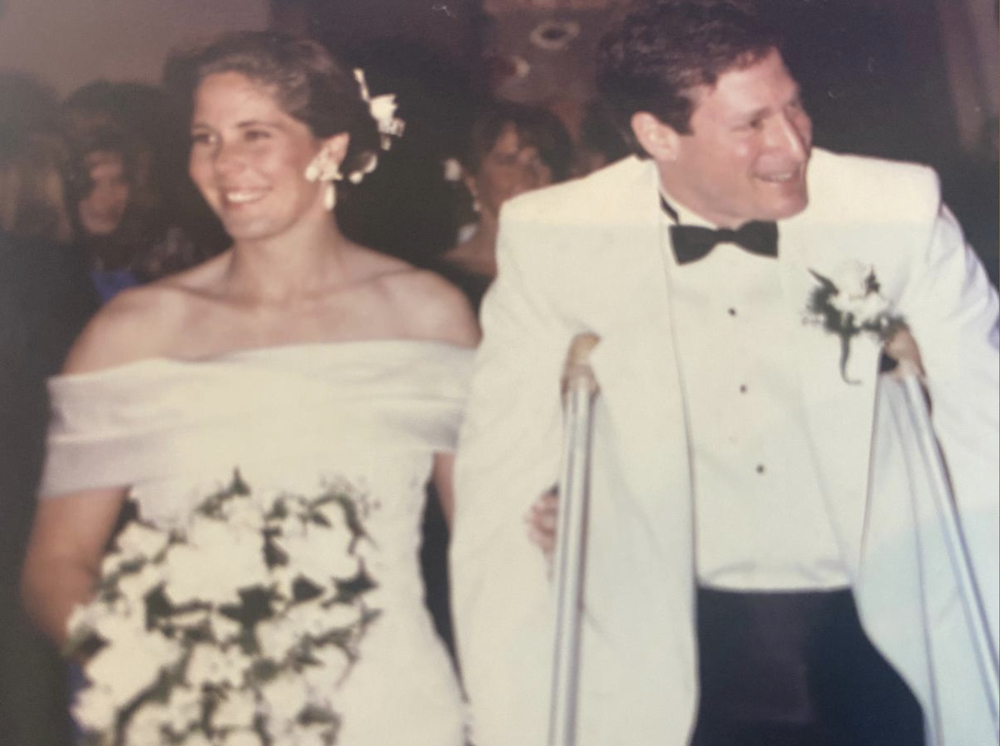Considering the meaning and weight of “I do” when it comes to a ratified Purchase Agreement.
[SPONSORED]
The personal stories of one Realtor’s battles and triumphs in the highly-competitive Bay Area Real Estate Market, seeking to illuminate and humanize the very real ups-and-downs of homeownership.
Thirty-two years ago today, my husband and I stood before the rabbi, our family, and our friends to recite our vows. (Yes, Cliff was on crutches which made the first dance kind of tough.) The act of a wedding, of a marriage, or of a legal union isn’t just a public declaration of one’s love, it’s the ultimate social contract.
But let’s be real; a long and sustained marriage is a highly aspirational concept at best. Consequently, I’m in awe that all these years later, Cliff and I still enjoy spending time together and making one another laugh. (Humor can get you through just about anything.) Hands down, Cliff, is the best decision I ever made; I can’t believe how “lucky in love” I’ve been.
On the other hand, when it comes to real estate, a ratified Purchase Agreement isn’t an “aspirational concept” at all, but a legal and binding contract.
Which is why it’s important to explain to Buyers the ramifications of changing their minds AFTER their offer has been accepted by the Seller, especially in today’s highly competitive world where contracts are often written “non-contingent,” due in large part to hefty competition at play.
BUT unless there’s a contingency built into the contract which stipulates a timeline for reconsideration (these include inspections, appraisals, and loan contingencies), there are NO escape routes.
“For better or for worse,” you’ve bought a house – “til death do you part!”
However, such strong admonitions don’t necessarily stop bad players from jumping into the mix.
“My clients are rescinding their offer,” the Realtor texted (as if it were that easy) after I’d inquired as to why the good-faith money had yet to arrive in escrow.
“They can’t unilaterally exit the agreement,” I responded. “They wrote a non-contingent offer which was accepted by the Seller. We expect them to close in seven days, per the contract.”
“But they didn’t deposit the earnest money,” she insisted, “they don’t want the house anymore.”
“That’s unfortunate,” I countered, “they still owe $42,000 (3% of the purchase price) to the Sellers. In fact, if they fail to act in good faith, your Buyers may be on the hook for far more.” (Failure to deposit the good-faith money in a timely fashion may mean that the Buyers are liable for the ENTIRE loss should the Sellers accept less in a subsequent sale.)
Back and forth we went.
“The Buyers are asking for the Sellers’ mercy,” the Agent pleaded, “they don’t have the money.”
“Let’s be clear,” I said, “YOU wrote the contract, YOU set the price, YOU stipulated the terms, and the Sellers accepted your Buyers’ offer in good faith. No one held a gun to their heads. We’ve now lost the momentum of the moment, AND the ability to leverage the other offers that were presented.”
“Moreover, if your Buyers don’t actually have the money, then you may have committed fraud and I encourage your clients to speak with a real estate attorney today.”
Meanwhile, I got on the phone with the other interested parties whose offers had not been accepted (not to mention my COMPASS manager) and set Plan B into action (a good Agent knows when and how to quickly pivot).
Long story short (and it was a LONG day) we put a back-up Buyer in place for nearly the same amount and released the Buyers with no consequences that afternoon. (LUCKY for them. The Sellers weren’t obligated to be kind.) Ten days later the house closed escrow, the new Buyers were thrilled , and the Sellers were as gracious as could be under, what could have been, very litigious circumstances. In short, “all’s well that ends well.”
As for the Agents? We all learned some valuable lessons.
Frankly, given the speed, the pressure, and the inability for Buyers to move more methodically through a significant life purchase, (aka buying a home), it’s a wonder that MORE real estate transactions don’t fall apart (for richer, for poorer, in sickness and in health).
However, with some quick thinking, creative problem solving, clear communication, flexibility, and a genuine willingness to work towards a solution, there’s almost always an alternative pathway forward. (However — get egos involved and it’s a whole other story.)
“I now pronounce you husband and homeowner.”
The ability to poke fun at ourselves is just a bonus. Here’s to 32 more years (of marriage . . . not real estate).
How can we help you?
Julie Gardner & Sarah Abel | Compass Realty
Not just Realtors, but consultants in all things house and home, we’re here to educate, explore, examine and refer . . . In short, you may count on us to take care of your home as if it were our own and anyone who knows us, knows we take pretty darn good care of our homes.
Learn MORE

